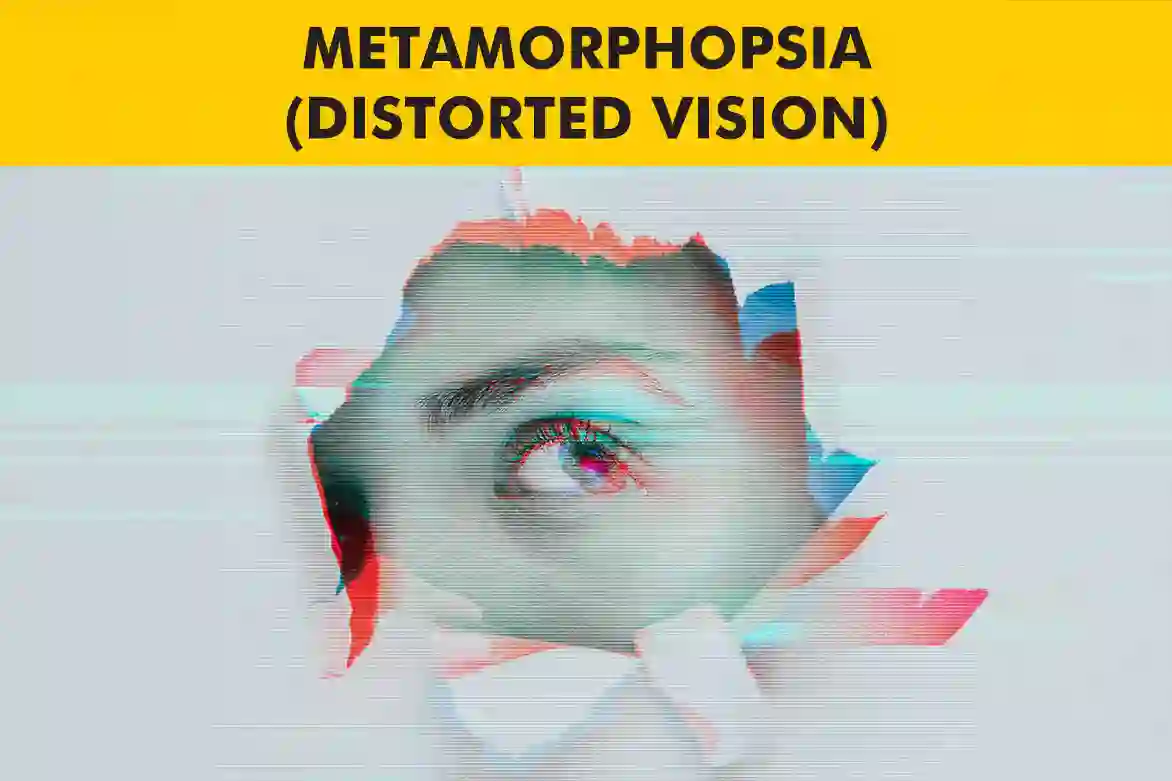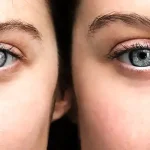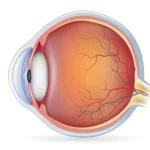|
Key Takeaways:
|
Metamorphopsia is a condition where what you see doesn’t match reality, straight lines look bent or wavy, shapes seem stretched or shrunken, and faces look “off.” This distortion affects your central vision, so everyday tasks like reading, driving, or recognising people can suddenly feel very difficult. Spotting these changes early and getting them checked is key to protecting your sight.
In this guide, you will learn metamorphopsia meaning, metamorphopsia causes, metamorphopsia symptoms and the best options for metamorphopsia treatment.
What is Metamorphopsia?
Metamorphopsia is a type of visual distortion where straight lines appear bent, wavy, or broken, and objects can look misshapen, stretched, or compressed.
It can affect one eye or both eyes, and many people first notice it when reading a book, looking at floor tiles, or checking the edges of doors and windows.
Importantly, metamorphopsia is not a disease by itself. It is a warning sign that something is affecting the retina, most often the macula, which is the part of the eye responsible for sharp, detailed vision.
When the macula is swollen, pulled, or damaged, the light-sensitive cells don’t line up properly. As a result, the brain receives a “twisted” image, which you experience as distortion.
A simple metamorphopsia test that doctors and patients use is the Amsler grid, a square grid of straight lines. If any lines look crooked, broken, or missing, it indicates metamorphopsia and should be checked by an eye specialist.
Symptoms of Metamorphopsia
Metamorphopsia symptoms can be very mild at first, which is why many people ignore them.
Over time, they become stronger or more constant, depending on the underlying retinal issue. Common symptoms include:
- Wavy or distorted lines in central vision, for example, text on a page or tiles on the floor look crooked or bent.
- Difficulty reading or recognising faces, letters look jumbled; familiar faces look “changed” or unclear.
- Objects appearing larger or smaller than they are (macropsia/micropsia), a door, phone, or person look unusually big or small.
- Problems with depth perception and spatial judgement leading to misjudging steps, bumping into objects, or feeling unsure about distances.
- Blurry central vision or a faint grey spot, the centre of what you’re looking at seems hazy, dim, or patchy.
- Unequal vision between eyes, one eye sees normally while the other sees distortion, making things look “uneven” when both eyes are open.
|
Important: If metamorphopsia is due to a progressive eye disease and is left untreated, these symptoms can slowly worsen. |
When to Seek Help?
You should never ignore new distortions in your vision. Early detection of metamorphopsia is important because it often points to a retinal or macular condition that can get worse if not treated in time.
Getting help early can prevent permanent damage in many conditions. Even if the metamorphopsia causes cannot be fully cured, timely treatment can protect as much vision as possible and reduce further distortion.
Seek an eye specialist promptly if you notice:
- Straight lines (like door frames, window edges, or ruled paper) suddenly look wavy, bent, or broken.
- Objects appear warped, tilted, or irregular in shape.
- Reading, recognising faces, or judging distances becomes harder than usual.
- There is a sudden change in one eye, or the distortion appears in both eyes.
It is especially important to consult an ophthalmologist if:
- You already have diabetes, hypertension, or age-related macular degeneration (AMD).
- You have a family history of macular disease or have undergone previous eye surgery.
- You notice rapid worsening of distortion, new dark spots, or a curtain-like shadow in your vision (which can suggest a more urgent problem like retinal detachment).
Metamorphopsia Causes
Metamorphopsia is a symptom of a problem in the macula or central retina.
Some of the most common metamorphopsia causes include:
- Age-related Macular Degeneration (AMD)
In AMD, the cells in the macula slowly wear out or get damaged. In the “wet” form, abnormal blood vessels leak fluid or blood under the retina. Both forms can make straight lines look wavy and blur central vision if not treated.
- Macular Oedema
Here, fluid collects within the macula, due to diabetes, retinal vein occlusion, inflammation, or after eye surgery. The swelling distorts the normal layers of the retina, which leads to blurry and distorted central vision.
- Epiretinal Membrane (ERM)
Also called a macular pucker, this happens when a thin sheet of scar tissue forms on the surface of the macula. As the membrane contracts, it “crumples” the retina underneath, causing image warping, double edges, or ghosting.
- Central Serous Chorioretinopathy (CSCR)
Fluid builds up under the central retina, creating a small “bubble” that lifts the macula. This can make straight lines look bent and objects look smaller or further away than they really are. Stress, smoking, steroids, and certain systemic conditions can be risk factors.
- Retinal Detachment Involving the Macula
If the macula is pulled away from its normal position due to a retinal detachment, vision can become blurred and distorted.
This is an emergency and needs urgent treatment to protect sight.
Less commonly, metamorphopsia can follow eye infections, trauma, or some post-surgery changes, but in all cases, the key point is that a structural change in the macula is disturbing how light is focused.
Diagnosis of Metamorphopsia
Diagnosing metamorphopsia means working out both the symptom and the disease behind it.
Also early diagnosis allows the doctor to choose the most appropriate metamorphopsia treatment and monitor how well it is working over time.
Your eye doctor will:
- Take a detailed history: When symptoms began, whether one or both eyes are affected, and any existing medical conditions like diabetes or AMD.
- Check visual acuity and central vision: Standard eye chart tests and near-vision reading checks.
- Do a metamorphopsia test, such as the Amsler grid: You look at a grid of straight lines; if you see any wavy, missing, or broken areas, it suggests macular involvement.
- Examine the retina and macula with a dilated eye exam: Use special lenses and a bright light to see the back of the eye.
- Use imaging tests like OCT (optical coherence tomography): This gives a cross-sectional “scan” of the retina and shows swelling, membranes, holes, or fluid under the macula.
- Order additional tests if needed such as fluorescein angiography to look at leaking blood vessels in AMD or vascular blockages.
Metamorphopsia Treatment
There is no one single metamorphopsia treatment because the symptom is driven by different diseases.
The main goal is to treat the root cause and then support the vision that remains. Depending on the diagnosis, your doctor can suggest:
- Anti-VEGF Injections
For conditions like wet AMD or diabetic macular oedema, anti-VEGF (vascular endothelial growth factor) injections are used to reduce leakage and swelling in the macula.
By drying out the retina and stopping abnormal vessel growth, these injections can improve or stabilise vision and reduce distortion in many patients.
- Laser Therapy
In some cases of CSCR or retinal vascular problems, laser treatment can be used to seal leaking spots or improve circulation.
The aim is to reduce fluid and stabilise the retinal layers, which can lessen metamorphopsia over time.
- Vitrectomy and Membrane Peeling
If an epiretinal membrane or vitreomacular traction is causing the distortion, a retina surgeon advise vitrectomy surgery.
During this procedure, the vitreous gel is removed and the membrane on the macula is carefully peeled away, allowing the retina to relax back into a more natural shape.
- Low Vision Aids and Visual Rehabilitation
If some distortion remains even after medical or surgical treatment, low vision aids can help you function better. These include magnifiers, high-contrast filters, electronic reading devices, screen readers, and training to use healthier parts of your vision.
- Holistic Support
Because living with metamorphopsia can be frustrating or emotionally draining, good care also includes education, counselling, and lifestyle advice, such as diet, control of systemic diseases, and managing lighting and contrast at home and work.
Prevention of Metamorphopsia
Not every case of metamorphopsia can be prevented, but you can lower the risk of serious retinal problems or catch them earlier by:
- Having regular eye examinations, especially after 40 or if you have diabetes, hypertension, or a family history of macular disease.
- Keeping blood sugar, blood pressure, and cholesterol under good control.
- Wearing UV-protective sunglasses outdoors and protective eyewear in risky work or sports.
- Avoiding smoking and following a balanced diet rich in leafy greens, fruits, and omega-3 fats, which support eye health.
- Using tools like an Amsler grid at home to check for new distortion and contacting your eye doctor if you notice changes.
Living with Metamorphopsia
Living with metamorphopsia can feel unsettling because what you see does not always match what you “know” is there.
However, with the right help and small changes, many people continue to work, read, and manage daily life.
- Improving lighting at home, using bigger fonts and high-contrast settings on phones and computers, and keeping furniture and pathways clear can reduce visual confusion.
- Labelling items, using colour coding, and arranging things in fixed places also help your brain build reliable routines.
- Vision rehabilitation programmes can teach practical strategies, and speaking to a counsellor or support group can help the emotional side of living with distorted vision.
Conclusion
Metamorphopsia is a warning sign that the macula or central retina needs attention. While it can make straight lines look wavy and everyday tasks more difficult, it also gives you an early chance to act.
By understanding metamorphopsia causes, getting accurate tests like the Amsler grid and OCT, and starting the right metamorphopsia treatment in time, you can protect your remaining vision and adapt more confidently.
If you ever notice new distortion, don’t wait, book an eye examination and let a retina specialist guide you on the safest next steps.
FAQs
Can metamorphopsia affect both eyes at the same time?
Yes, metamorphopsia can affect both eyes at the same time depending on the underlying disease or conditions like age-related macular degeneration or diabetic macular oedema.
Is metamorphopsia related to LASIK or other eye surgeries?
No, metamorphopsia is not related to LASIK or other eye surgeries and is linked to retinal or macular problems, not to the cornea, so standard LASIK for glasses power does not cause it or can fix it.
Can stress or fatigue worsen metamorphopsia symptoms?
Yes, stress or fatigue can worsen metamorphopsia symptoms, by making you more aware of visual distortion or trigger conditions like central serous chorioretinopathy in some people, which in turn lead to metamorphopsia.
Does metamorphopsia always mean serious eye disease?
No, metamorphopsia doesn’t always mean a serious eye disease but it almost always points to some change in the macula or retina, but the severity can range from mild, treatable swelling to more serious conditions.
Can metamorphopsia go away after treatment?
Yes, metamorphopsia can go away after treatment in some patients once the underlying cause, such as macular fluid, epiretinal membrane, or CSCR is treated, but in others a degree of distortion can remain, making regular follow-up and low-vision support important.





